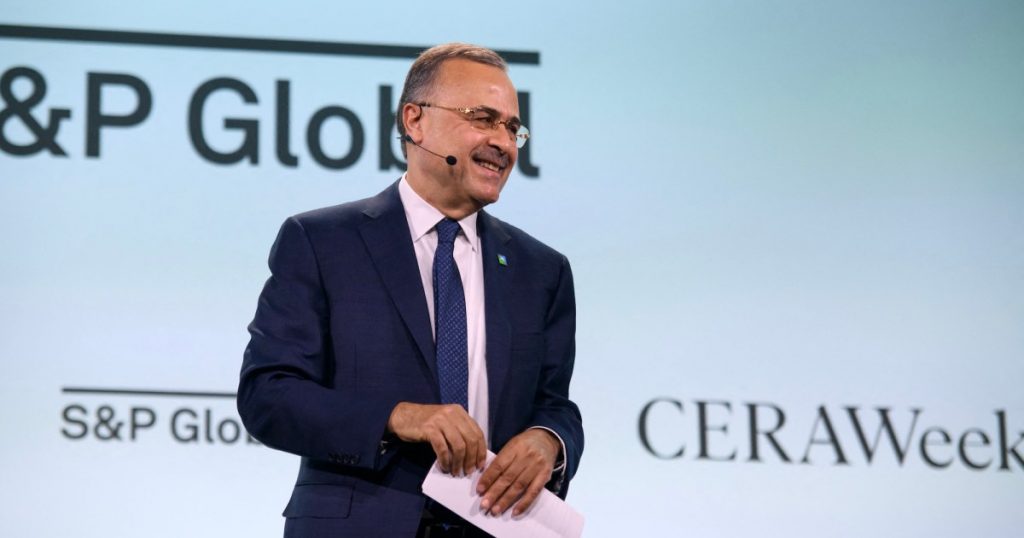In Texas, Fossil Fuel CEOs Ridicule Nation’s Clean Energy Push
This story was originally published by the Guardian and is reproduced here as part of the Climate Desk collaboration.
The bosses of the world’s leading oil and gas companies have poured scorn on efforts to move away from fossil fuels, complaining that a “visibly failing” transition to clean energy was being pushed forward at an “unrealistic pace.”
The oil executives, gathered at the industry’s annual Cera Week conference in Houston, Texas, have taken turns this week to denounce calls for a rapid phase-out of fossil fuels, despite widespread acknowledgment within the industry, as well as scientists and governments, of the need to radically reduce planet-heating emissions to avoid the worst effects of the climate crisis.
“We should abandon the fantasy of phasing out oil and gas, and instead invest in them adequately,” said Amin Nasser, chief executive of Saudi Aramco, the world’s largest oil company, to applause in the room.
Nasser dismissed projections by the International Energy Agency (IEA) that global demand for oil and gas will peak by 2030, claiming that rising energy costs mean that people will require “the importance of oil and gas security” rather than shift to renewables.
“In fact, in the real world, the current transition strategy is visibly failing on most fronts,” Nasser added, criticizing solar, wind, and electric vehicles for what he said was a minimal impact in cutting greenhouse gas emissions.
“And, despite our starring role in global prosperity, our industry is painted as transition’s arch-enemy,” Nasser complained.
This skepticism was echoed by other leading executives at the conference, which gathers industry leaders and politicians in Texas’s oily heartland. Meg O’Neill, chief executive of Woodside Energy, said that the transition to clean energy cannot “happen at an unrealistic pace,” predicting that cleaner fuels could take up to 40 years to develop.
“It has become emotional,” O’Neill said of the climate debate. “And when things are emotional, it becomes more difficult to have a pragmatic conversation.”
“If we rush or if things go the wrong way, we’ll have a crisis that we will never forget,” warned Jean Paul Prates, chief executive of Petrobras, Brazil’s state-owned oil corporation, about the shift to clean energy.
The comments were swiftly denounced by climate campaigners.
Those in the industry “work night and day to torpedo a transition to renewable energy and then have the audacity to critique the slowness of the transition itself,” said Jeff Ordower, North America director of 350.org. “Cera Week should highlight a global vision toward a clean and equitable future, and instead, we get talking points from the 1970s.”
“We should be skeptical of any solutions touted by the industry because it’s clear they don’t have a real interest in halting the climate crisis,” Ordower added.
The conference, which has the “multi-dimensional, multi-speed, and multi-fuel energy transition” as its theme, is being held to a backdrop of several major oil and gas companies reversing their plans to cut production and watering down targets to eliminate greenhouse gases, even as they bask in near-record profits.
Darren Woods, the chief executive of Exxon, who recently said the public is unwilling to pay for a world with less carbon pollution, has used Cera Week to instead talk up the prospects of carbon capture and hydrogen technologies, which the industry sees as acceptable avenues for government subsidy that do not threaten the central business model of drilling for oil and gas.
Scientists are clear, however, that the world needs to get to net zero emissions by the mid-point of this century to avoid disastrous heatwaves, droughts, floods, and other climate-driven impacts and so far no technology is able to ameliorate the primary task of not burning more oil, gas, and coal.
According to the IEA, which has called the fossil-fuel industry “a marginal force at best” in investing in the transition to clean energy, oil and gas use would have to decline by more than 75 percent by 2050 if the world is to keep to the internationally agreed goal of limiting global heating to 1.5C beyond pre-industrial times.
This would require the curtailing of an unprecedented boom in gas infrastructure along the US’s Gulf of Mexico coast, which Joe Biden’s administration recently sought to dampen by announcing a pause in new exports of liquified natural gas from these facilities. At Cera Week, however, Jennifer Granholm, Biden’s energy secretary, said that the pause will be “long in the rear-view mirror” in a year’s time.
In Houston, climate activists, including those who staged a mock funeral march outside the conference on Tuesday to represent communities blighted by oil and gas development, said the industry executives had shown their true intentions at the gathering.
“If you look at their actions, it’s clear that not only are they not committed to reducing emissions, they’ve actually come to Cera Week to continue promoting fossil fuel production and extraction and delaying the transition to a just, clean energy future,” said Josh Eisenfeld, campaign manager of corporate accountability at Earthworks.
Aly Tharp, a campaigner at GreenFaith, said activists had been purposely barred from registering to attend the event, leaving them to voice their objections outside the venue. “I have a moral obligation to disrupt the systematic poisoning of our planet being caused by fossil fuels,” she said. “These harms need to be seen and understood and not left out of the conversation.”





